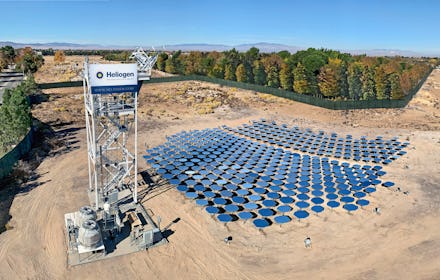Bill Gates has invested billions of dollars into different companies — some that you've undoubtedly heard of and some that are so obscure that they barely have a public presence. Heliogen falls into the latter category, but it had a big coming-out party this week. On Tuesday, the secretive startup operating almost entirely in the dark announced that it achieved a significant technological breakthrough that will use artificial intelligence, mirrors and solar power to create carbon-free building materials.
The upshot of the company's technology is this: Heliogen uses advanced computer vision software to align a massive array of mirrors that can be used to reflect sunlight onto a singular target. The technology allows that energy to be considerably more concentrated than alternatives that came before it, resulting in temperatures greater than 1,000 degrees Celsius — nearly double the temperatures that previous methods have managed to achieve and about one-fourth as hot as the surface of the sun. That level of heat can be used in the manufacturing process for industrial materials including cement, steel and glass — and can theoretically do so at a cheaper price point than fossil fuel alternatives, according to the company, opening up the possibility for more environmentally friendly construction.
The reason that Heliogen's technology is so promising is because the manufacturing industry has largely gone untouched by green technologies. While electric vehicles have gained popularity and renewable energy sources like wind and solar have become more common providers for power grids, construction still relies primarily on fossil fuels for much of its processes. That is troubling in a time when many large countries are still developing and building, placing higher demand on these carbon-emitting processes. The International Energy Agency (IEA) has warned that cement production is expected to increase by between 12 and 23 percent by 2050 as countries continue to urbanize. The process of creating cement already accounts for seven percent of global carbon emissions, according to the IEA, and is responsible on its own for as much as seven percent of all industrial energy use. Environmental think tank Chatham House estimates that cement manufacturing accounts for eight percent of all carbon emissions, contributing more to pollution than fuel for airlines does. The BBC estimated that if the cement industry was its own country, it would be the third-largest carbon emitter in the world behind China and the United States.
“Today, industrial processes like those used to make cement, steel, and other materials are responsible for more than a fifth of all emissions,” Bill Gates said in a statement. “These materials are everywhere in our lives but we don’t have any proven breakthroughs that will give us affordable, zero-carbon versions of them."
By creating temperatures hot enough to actually match what is needed to create these industrial materials, Heliogen has the opportunity to turn a still-growing industry green. The company isn't the first to make use of concentrated solar power — similar technologies have been used in the past to harness the sun to produce electricity — it is the first to achieve levels that exceed those needed to produce cement, steel and other materials. It also doesn't plan to stop there. According to Heliogen, its roadmap suggests that it will soon be able to reach temperatures of up to 1,500 degrees Celsius, which would open up a whole lot of new possibilities when it comes to producing energy. The company believes that at those temperatures, it can perform carbon- and water-splitting needed to create clean, carbon-free hydrogen. That hydrogen could then be used as a fuel source for everything from trucks to airplanes, assuming the company can produce it at scale.
Heliogen's technological breakthrough is a noteworthy development, but now it's up to industrial companies to embrace the clean alternative to the carbon-emitting fuels that they have grown so accustomed to. Making the switch will require an investment in the new technology, but Heliogen does have one thing going its favor: sunlight, unlike oil and other fossil fuels, is free. That presents the possibility that switching to the green technology may save money over time. If saving the planet from a massive source of pollution isn't enough to convince industrial companies to make the switch, maybe saving some bucks on their bottom line will.
